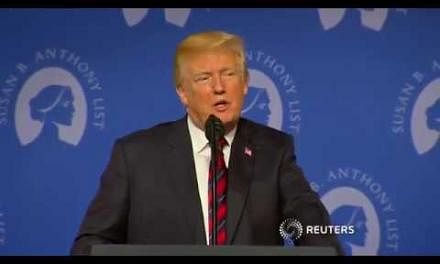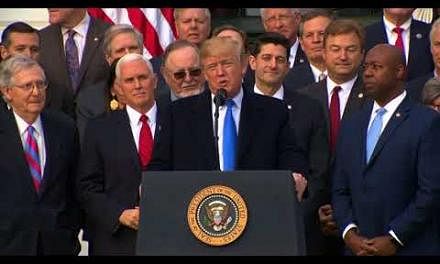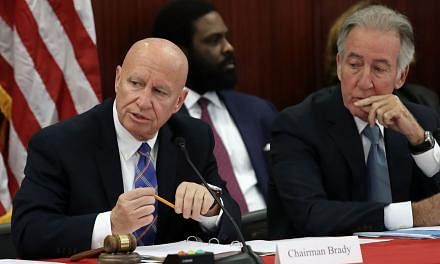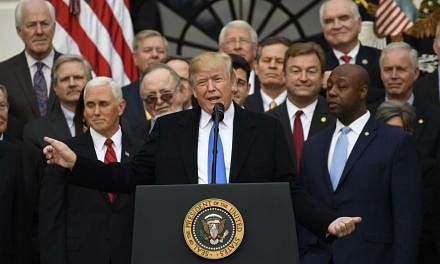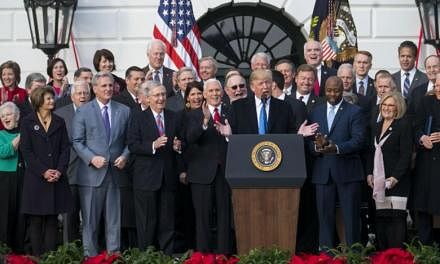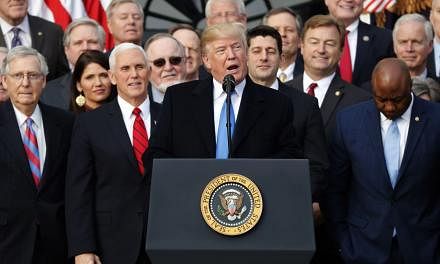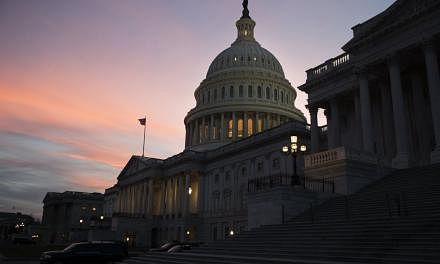WASHINGTON (REUTERS, WASHINGTON POST) - Republicans in the US Congress were on the verge of passing the most significant overhaul of tax code since 1986 on Tuesday (Dec 20) after the Senate approved the plan on Tuesday (Dec 19) evening and House leaders scheduled a Wednesday morning vote to send it to President Donald Trump.
The sprawling measure would cut the corporate tax rate dramatically, and the vast majority of households would see their income taxes go down in 2018, with the largest savings going to the wealthy. The Bill also proposes revising nearly every part of the tax system by restructuring income tax rates and expanding some popular deductions while paring back others.
House Republicans thought they had finished their tax work on Tuesday afternoon when they passed a version of the Bill 227 to 203. But the effort hit a snag on Tuesday afternoon when the Senate parliamentarian ruled that three of its provisions violated that chamber's Byrd Rule - guidelines on what types of legislation can pass with a simple 50-vote majority.
The provisions were the "Cruz provision", which allows 529 education savings plans to be used for homeschool expenses; a provision on determining university endowment taxes, and the title of the Bill, itself, "The Tax Cuts and Jobs Act".
The Senate made a series of minor tweaks to the Bill to comply with the Byrd Rule on Tuesday before passing the Bill, requiring the House to vote again as the two chambers must pass identical versions.
The following are known provisions on which House of Representatives and Senate tax writers have agreed:
BUSINESSES CORPORATE TAX RATE
Falls to 21 per cent from 35 per cent. The House and Senate Bills, as well as Trump, had earlier proposed 20 per cent. Going to 21 per cent gave tax writers more federal revenue needed to make the tax cut immediate. US corporations have been seeking a large tax cut like this for many years.
PASS-THROUGH BUSINESSES
Creates a 20 per cent business income deduction for owners of pass-through businesses, such as sole proprietorships and partnerships. The House had proposed a 25 per cent tax rate; the Senate, a 23 per cent deduction.
CORPORATE MINIMUM
Repeals the corporate alternative minimum tax, which was set up to ensure profitable companies pay at least some federal tax.
TOP INDIVIDUAL INCOME TAX RATE
Falls to 37 per cent from 39.6 per cent. The House had proposed maintaining the 39.6 per cent top rate and condensing the current seven tax brackets to four. The Senate had proposed cutting the top rate to 38.5 per cent and maintaining the seven brackets.
PERMANENCE
The expectation is individual tax rates will snap back to current levels in less than 10 years. The individual tax rates in the House Bill were permanent. The individual tax rates in the Senate Bill would have expired after 10 years.
STATE AND LOCAL TAX (SALT)
Both the House and Senate had proposed scaling back a popular individual deduction for state and local tax payments by limiting it to property-tax payments and capping it at US$10,000 (S$13,464). The compromise Bill is expected to keep that cap, but also allow for continued deduction of state and local income tax payments.
MORTGAGE INTEREST
Caps the mortgage interest deduction at US$750,000 in home loan value, down from the current US$1 million. The House had proposed a US$500,000 cap. The Senate Bill left it at US$1 million.
ESTATE TAX
Roughly doubles the exemption from the federal estate tax on inherited assets to about US$11 million, but leaves the tax in place, mirroring the Senate proposal. The House Bill had raised the deduction, but also entirely phased out the tax.
OBAMACARE MANDATE
Repeals a federal fine imposed on Americans under Obamacare for not obtaining health insurance coverage. The House Bill did not repeal the Obamacare individual mandate.
ANWR DRILLING
Allows oil drilling in Alaska's Arctic National Wildlife Refuge. The provision was sponsored by Republican Senator Lisa Murkowski of Alaska.
EDUCATION SAVINGS
The Bill has a provision on 529 plans, which allow families to save money for college tax-free. The plans are tweaked under the new tax overhaul, letting families also withdraw limited funds from those accounts for private or home-school expenses for K-12 - a measure pushed by school-choice advocates. But the House bill added some pointed language, which basically said that an "unborn child" could be a designated beneficiary of such accounts. However, this language was dropped in the Senate Bill as it ran foul of the Byrd Rule.
UNIVERSITY ENDOWMENT TAX
The Senate Bill dropped a planned waiver of a new 1.4 per cent tax on private university endowments for certain colleges. The tax would have applied only to colleges with at least 500 "tuition-paying" students, helping some smaller colleges with large endowments escape the burden. But with the Senate parliamentarian ruling the "tuition-paying" student requirement out of order, Republicans dropped it from the Bill so that it meets the Byrd rule.

